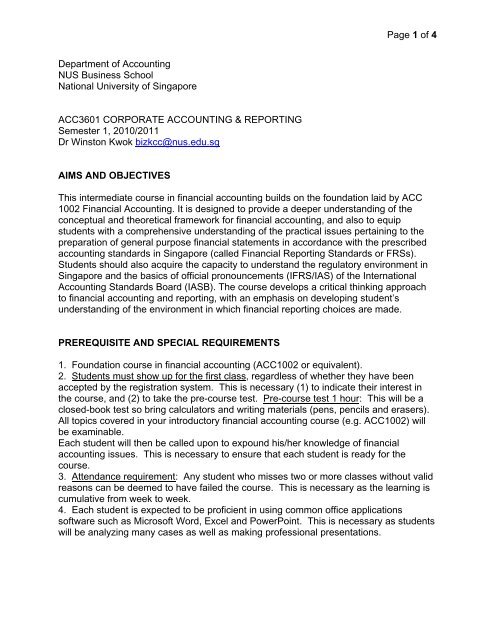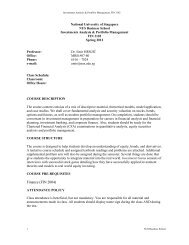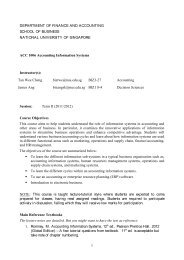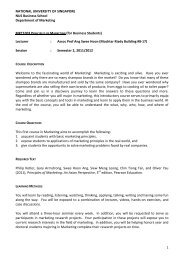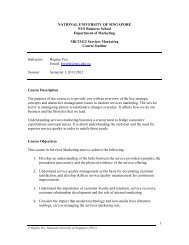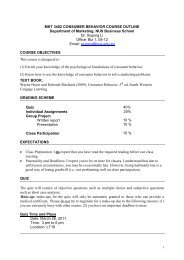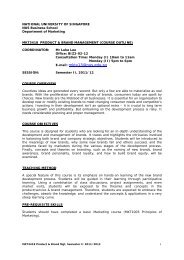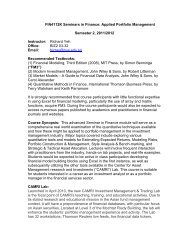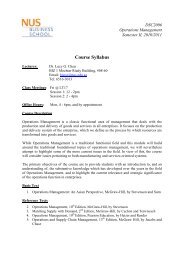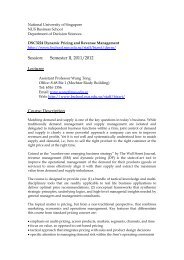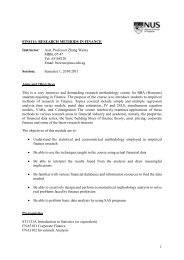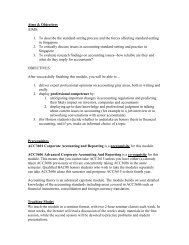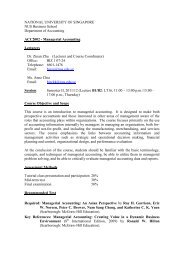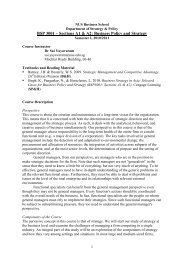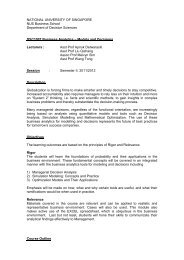Department of Finance & Accounting - NUS - BBA
Department of Finance & Accounting - NUS - BBA
Department of Finance & Accounting - NUS - BBA
Create successful ePaper yourself
Turn your PDF publications into a flip-book with our unique Google optimized e-Paper software.
Page 1 <strong>of</strong> 4<br />
<strong>Department</strong> <strong>of</strong> <strong>Accounting</strong><br />
<strong>NUS</strong> Business School<br />
National University <strong>of</strong> Singapore<br />
ACC3601 CORPORATE ACCOUNTING & REPORTING<br />
Semester 1, 2010/2011<br />
Dr Winston Kwok bizkcc@nus.edu.sg<br />
AIMS AND OBJECTIVES<br />
This intermediate course in financial accounting builds on the foundation laid by ACC<br />
1002 Financial <strong>Accounting</strong>. It is designed to provide a deeper understanding <strong>of</strong> the<br />
conceptual and theoretical framework for financial accounting, and also to equip<br />
students with a comprehensive understanding <strong>of</strong> the practical issues pertaining to the<br />
preparation <strong>of</strong> general purpose financial statements in accordance with the prescribed<br />
accounting standards in Singapore (called Financial Reporting Standards or FRSs).<br />
Students should also acquire the capacity to understand the regulatory environment in<br />
Singapore and the basics <strong>of</strong> <strong>of</strong>ficial pronouncements (IFRS/IAS) <strong>of</strong> the International<br />
<strong>Accounting</strong> Standards Board (IASB). The course develops a critical thinking approach<br />
to financial accounting and reporting, with an emphasis on developing student’s<br />
understanding <strong>of</strong> the environment in which financial reporting choices are made.<br />
PREREQUISITE AND SPECIAL REQUIREMENTS<br />
1. Foundation course in financial accounting (ACC1002 or equivalent).<br />
2. Students must show up for the first class, regardless <strong>of</strong> whether they have been<br />
accepted by the registration system. This is necessary (1) to indicate their interest in<br />
the course, and (2) to take the pre-course test. Pre-course test 1 hour: This will be a<br />
closed-book test so bring calculators and writing materials (pens, pencils and erasers).<br />
All topics covered in your introductory financial accounting course (e.g. ACC1002) will<br />
be examinable.<br />
Each student will then be called upon to expound his/her knowledge <strong>of</strong> financial<br />
accounting issues. This is necessary to ensure that each student is ready for the<br />
course.<br />
3. Attendance requirement: Any student who misses two or more classes without valid<br />
reasons can be deemed to have failed the course. This is necessary as the learning is<br />
cumulative from week to week.<br />
4. Each student is expected to be pr<strong>of</strong>icient in using common <strong>of</strong>fice applications<br />
s<strong>of</strong>tware such as Micros<strong>of</strong>t Word, Excel and PowerPoint. This is necessary as students<br />
will be analyzing many cases as well as making pr<strong>of</strong>essional presentations.
Page 2 <strong>of</strong> 4<br />
SCHEDULE<br />
Classes commence from Week 1 (week beginning 9 Aug 2010), and the respective<br />
sections and times are:<br />
Section A1 Mon 11am and Thu 11am<br />
Section A2 Mon 2pm and Tue 2pm<br />
Section A3 Tue 11am and Thu 2pm<br />
All classes in room Biz1 2-5<br />
Note: Since Mon 9 Aug is a public holiday, the 1st class with A1 and A2 will be on Thu<br />
12 Aug and Tue 10 Aug respectively.<br />
SYNOPSIS<br />
The course provides a framework for understanding management’s accounting choices<br />
and how accounting affects reported financial statement numbers. It also illustrates the<br />
incentives for managers to manage reported earnings, and how alternatives and<br />
flexibility in accounting principles and standards give managers discretion in the timing<br />
<strong>of</strong> earnings and in reporting financial results and financial position. It begins with a<br />
discussion <strong>of</strong> the institutional and regulatory environment and an analysis <strong>of</strong> the<br />
demand/supply economics <strong>of</strong> accounting information. The lectures cover IFRS and<br />
FRSs, principles- versus rules-based standards, and some issues in international<br />
financial reporting. Core topics include revenue, segment reporting, EPS, interim<br />
reporting, intangible assets, impairment, liabilities and contingencies, changes in<br />
accounting policies, leases and income taxes.<br />
The course requires some readings from pr<strong>of</strong>essional articles and the financial press,<br />
and coverage <strong>of</strong> 14 FRSs for the different topic areas. The careful selection <strong>of</strong> major<br />
assignments, discussion questions, problems, cases and application <strong>of</strong> the FRSs is<br />
designed to achieve the optimum balance between the required coverage <strong>of</strong> content<br />
and stimulating independent learning and critical thinking. The applied and practical<br />
aspects <strong>of</strong> the course will also be emphasized though discussion <strong>of</strong> topical issues in<br />
pr<strong>of</strong>essional journals, business cases and the financial press.<br />
Preparatory reading by the students before class is essential for better understanding <strong>of</strong><br />
the course material, active class participation, and optimal learning. The course<br />
assumes that students have already acquired the fundamental accounting knowledge<br />
and the detailed mechanics <strong>of</strong> accounting procedures, including technical details <strong>of</strong><br />
some accounting standards, from the ACC1002 Financial <strong>Accounting</strong> course. The initial<br />
pace is fast, and students are strongly advised to keep up with the readings and<br />
assignments to maximize their understanding <strong>of</strong> the subject. Details <strong>of</strong> the assigned<br />
readings and assignments will be provided in separate handouts.
Page 3 <strong>of</strong> 4<br />
SYLLABUS<br />
1. The economic and institutional setting for financial reporting<br />
2. Segment reporting/operating segments<br />
3. Revenue recognition<br />
4. Construction contracts<br />
5. Borrowing costs<br />
6. Changes in accounting policies, accounting estimates and errors<br />
7. Miscellaneous topics (e.g., events after the balance sheet date, earnings<br />
management, role <strong>of</strong> accounting information in contracting)<br />
8. Topics in accounting for assets (Intangibles, revaluation, impairment, fair value)<br />
9. Earnings per share, interim financial reporting<br />
10. Income taxes<br />
11. Topics in accounting for liabilities, provisions and contingent assets and liabilities<br />
12. Leases<br />
13. <strong>Accounting</strong> issues relating to financial statements and disclosure (e.g., first-time<br />
adoption <strong>of</strong> financial reporting standards, discontinued operations).<br />
A detailed reading list for each topic and homework questions will be provided<br />
separately.<br />
LEARNING MODES<br />
Every week will be ‘seminar’ style, similar to a business meeting where everyone has to<br />
be fully prepared before class and participate actively during class.<br />
TEXTS AND READINGS<br />
The following are essential:<br />
1. Singapore Financial Reporting Standards (FRSs) issued by the <strong>Accounting</strong><br />
Standards Council. The FRSs are available on the following<br />
website: http://www.asc.gov.sg<br />
2. Dr Winston Kwok’s Powerpoints and other notes, including Harvard cases.<br />
Other texts will be advised in due course.
Page 4 <strong>of</strong> 4<br />
ASSESSMENT<br />
(Subject to change, depending on enrolment size)<br />
Individual<br />
Class participation<br />
20%<br />
(You should speak up every class)<br />
Mid-term test 20%<br />
Final Exam 40%<br />
(scheduled by <strong>BBA</strong> <strong>of</strong>fice to be 9am Fri 26 Nov 2010)<br />
Group<br />
Presentation followed by Q&A (business attire) 20%<br />
100%<br />
COURSE WEBSITE<br />
Please check the IVLE regularly for updates.


